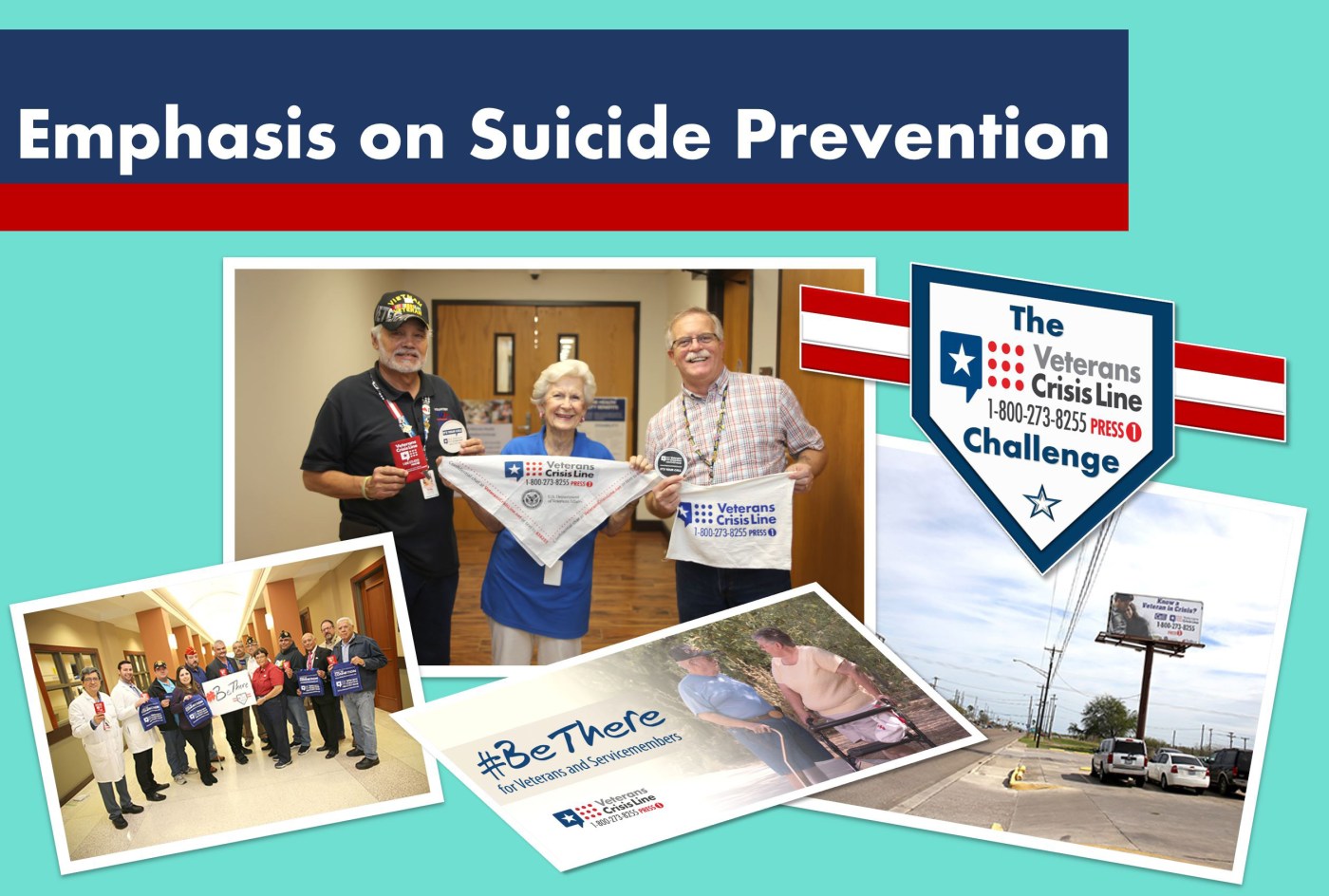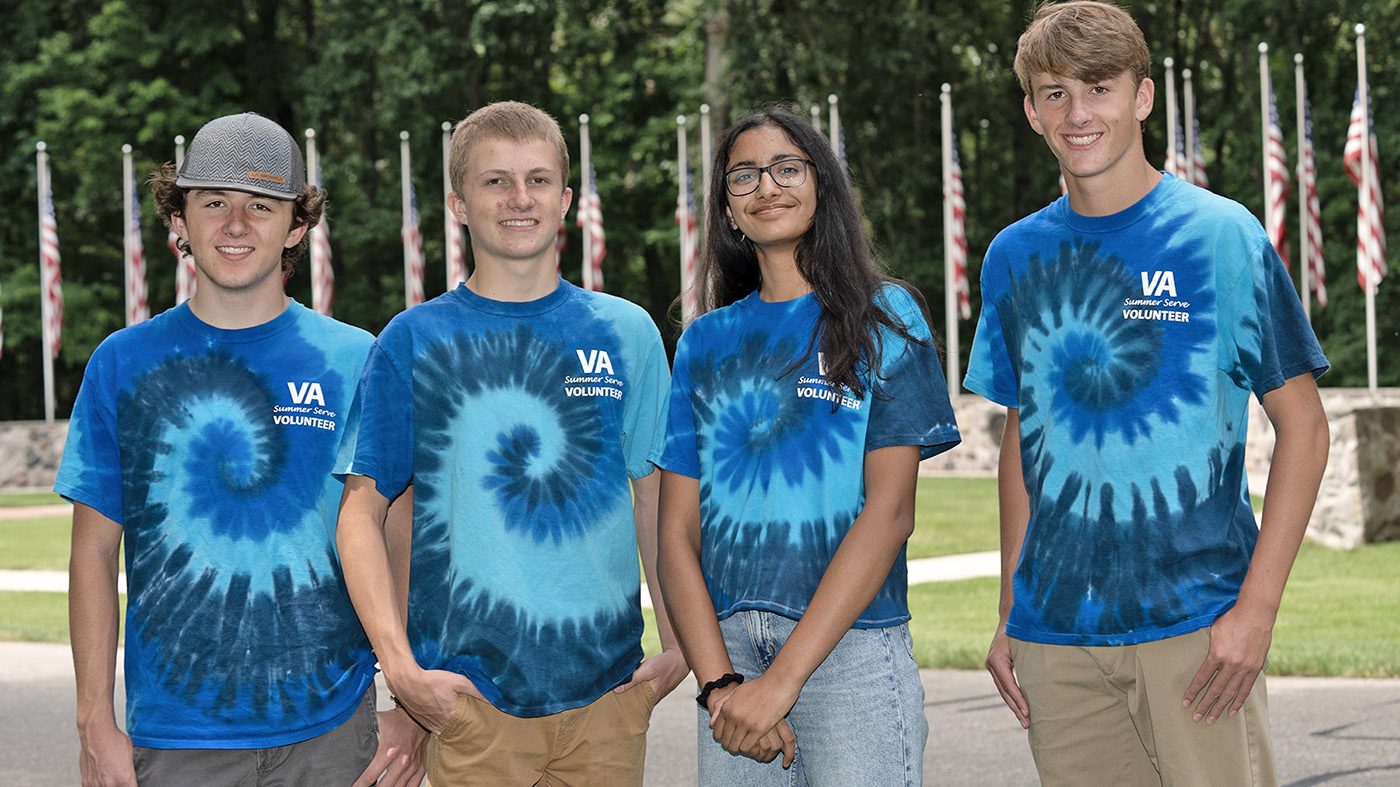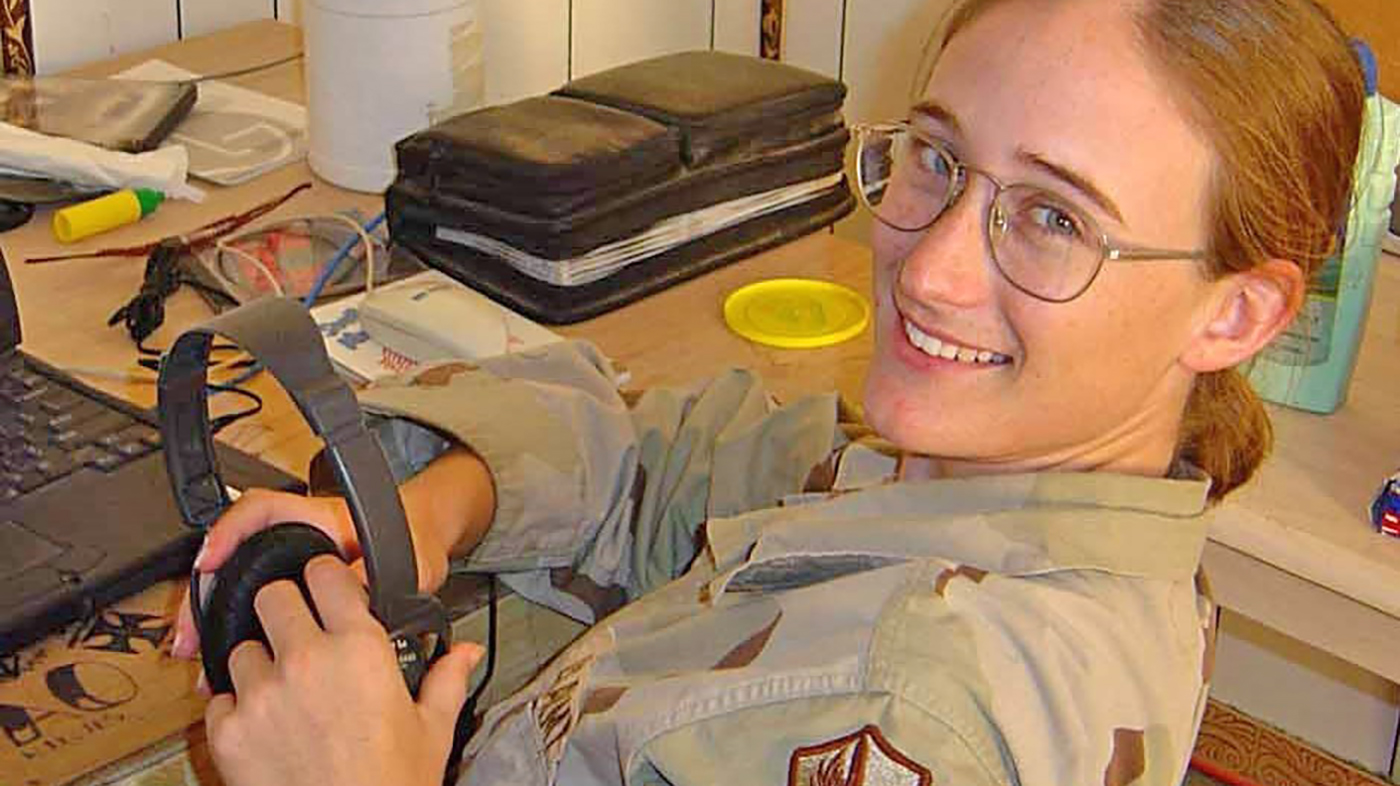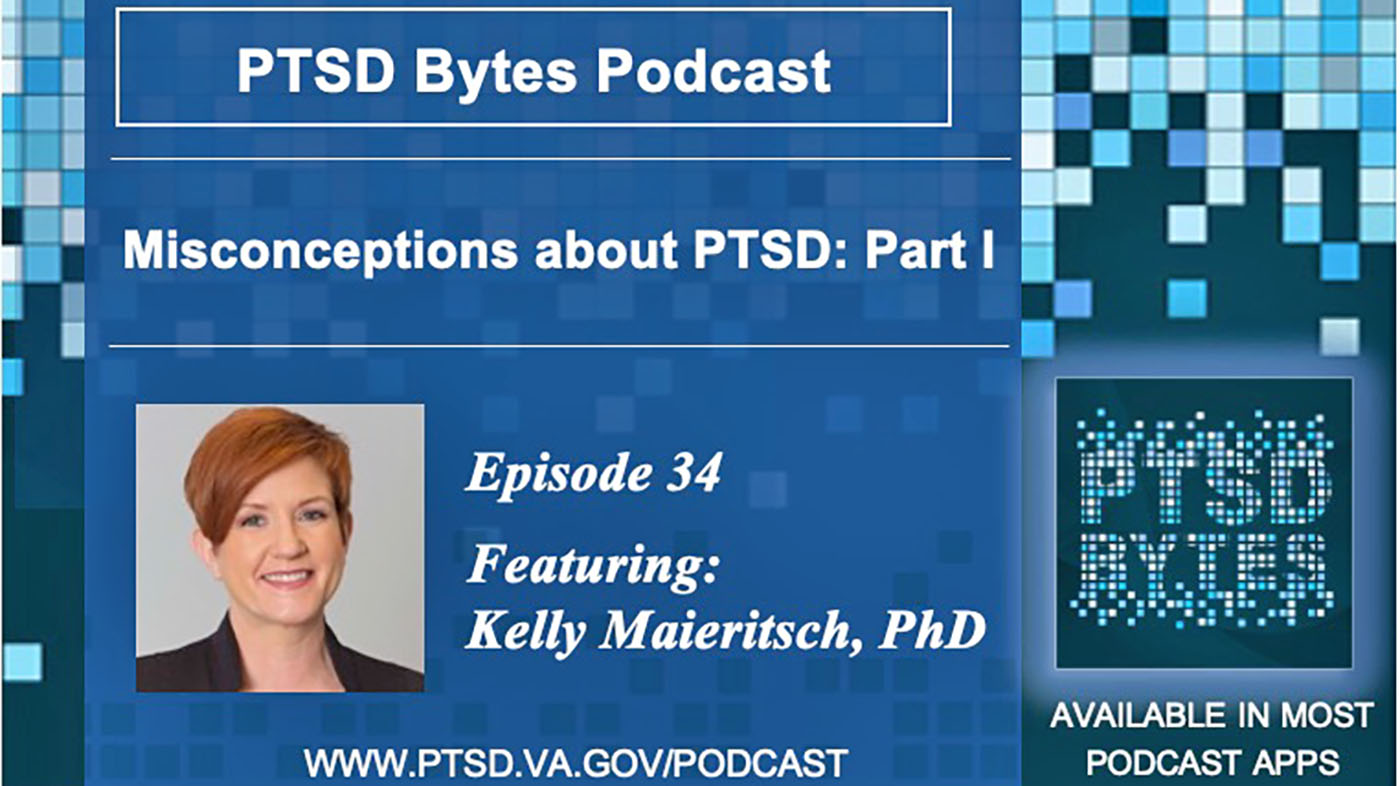HARLINGEN, Texas — Veterans enrolled in the VA health care system and have access to high-quality mental health services, including inpatient and outpatient care for depression, military sexual trauma and posttraumatic stress disorder (PTSD); however, not all Veterans are enrolled in the VA health care system.
“The VA recognizes that the challenges and tribulations brought on by such medical conditions occur whether a person is enrolled in the VA health care or not; therefore, the VA provides programs and services to help Veterans and their families in obtaining assistance during a crisis,” said Dr. Rodolfo A. Quintana, a psychologist who serves as the suicide prevention coordinator for VA Texas Valley Coastal Bend Health Care System (VCB).
“Suicide is a national public health concern, but it is preventable, and as VA Secretary Robert Wilkie stated earlier this month, ‘preventing Veteran suicide is our number one clinical priority,’ so it goes without say that local VA healthcare systems like ours have an important role to play.”
That role as Quintana referred to involves taking steps to help raise awareness about suicide prevention, because according to him, “knowing that help is available and how a person can get it is critical for suicide prevention.”
Those recent steps came in the different forms of outreach efforts in irder inform the public about the free programs such as the Veterans Crisis Line (VCL), which since its launch in 2007, has answered more than 3.5 million calls and initiated the dispatch of emergency services to callers in crisis nearly 100,000 times, of which more than 39,000 have been lifesaving rescues.
[carousel ids=” 56141, 56142, 56143, 56144, 56146, 54548, 54543, 56147, 56148″]Officers from various nationally-known Veteran Service Organizations such as the Disabled American Veterans, the Veterans of Foreign War and the American Legion were sought out by VA staff members to help spread the word to fellow Veterans and their families. Locally-established VSOs such as the Veterans Advisory Board for the city of Harlingen and the Veterans Memorial Project Committee also agreed to share information about the life-saving-help line during major community events.
In the end officers from all the fore mentioned VSOs came together as a sign of unity and solidarity for a group photo that featured VCL items and a poster with the #BeThere campaign, which encourages others to show genuine, heartfelt support by performing simple everyday actions such as Calling a friend, meeting a colleague for coffee, having dinner with a relative.
“These simple acts of kindness can seem small, but they may have the power to make a huge positive difference for someone having a difficult time,” said Quintana.
“Even a simple thing like asking how a person is doing via text or social media can have a positive impact on someone in need. Sometimes technology can help express that we care especially now with newer, more tech-savvy generation of Veterans. That is why several of our promotional items now also feature Maketheconnection.net, which like the Veterans Crisis Line is another free online resource designed to connect Veterans, their family members and friends, and other supporters with information, resources, and solutions to issues affecting their lives.”

VA volunteer LaVerne Shrader helps raise awareness about suicide prevention by passing out items like the bumper sticker with the Veterans Crisis Line logo and number to a Veteran on January 16, 2019, at the VA outpatient clinic in Corpus Christi, Texas. (U.S. Department of Veterans Affairs photo by Luis H. Loza Gutierrez)
The group photo also featured the logo for the Veterans Crisis Line Challenge, which was locally designed last year and used as a marketing tool to educate and engage local/regional elected officials and community leaders about the VA’s suicide prevention programs and goals.
The Veterans Crisis Line Challenge also known as the VCL Challenge consists of a person adding the Veterans Crisis Line logo and number (1-800-273-8255, Press 1) to their phone contacts list, then posting a photo on social media of themselves showing the number on their phone.
The outreach efforts did not stop with VSOs. VCB looked inward for help from Voluntary Services to help promote the free suicide prevention programs. VA volunteers were seen passing out items such as bumper stickers, cozies, wrist bands, coasters and bandanas with the VCL logo and number to patients and guests at the clinics.
“I’m usually out and about greeting people, passing out calendars and helping them check in at the kiosk for their appointments, but this makes my time here more meaningful because I’m providing them [Veterans and their families] with a piece of information that could save lives,” said LaVerne Shrader, a volunteer at the VA outpatient clinic in Corpus Christi, Texas.
Earlier this month the outreach efforts literally reached new heights in a big way across many locations, thanks to VCB’s partnership with TriWest Healthcare Alliance who helped sponsor the display of four billboards along busy roadways in and around the cities of Brownsville, Harlingen, McAllen and Corpus Christi. The billboards in the Brownsville, Harlingen and Corpus Christi were each 10 feet tall by 22 feet wide, but the one billboard near McAllen was the largest at a size of 10 by 40 feet. It was strategically placed along Interstate 2, a 47-mile long that heads eastward as a four-lane freeway through the Lower Rio Grande Valley and has the reputation of being one the Lone Star State’s busiest roadways utilized by tens of thousands of U.S., Canadian and Mexican motorists every day because of its proximity to the international border.
The suicide prevention program at VCB averaged 11 outreach events a month for a total of more than 130, and the VCB trio of Dr. Quintana, Nicole Theriot (suicide prevention program coordinator), and Cecilia Garza-Garcia (suicide prevention manager) plan on 2019 being another successful year of raising awareness and saving lives.
Future plans include continuing to increase participation in health fairs and college events, introduce the Veteran Crisis Line to different community agencies and provide S.A.V.E. training, which helps people become better at identifying the risk signs of suicide and how person can act with care and compassion if they encounter a person who is suicidal.
Quintana offered one more thought, about the recent efforts of VCB for suicide prevention.
“All of these recent endeavors or steps are more than just about raising awareness and passing along information,” he said. “Suicide prevention is much more than intervention at the point of crisis – it is about creating and fostering a culture where Veterans and their families thrive because we are all in this together that is why we have formed partnerships with the RGV Community Veteran Engagement Board and the RGV Veterans Coalition, which brings VSO’s, the VA and private organizations and groups together for the sole purpose to help Veterans in our communities.’
‘We must approach this important matter compassionately and clinically in order to build on the important lessons from the past, while continually expanding our efforts in new directions that keep us true to the mission President Lincoln left for us this nation to fulfill, “To care for him who shall have borne the battle, and for his widow, and his orphan” by serving and honoring the men and women who are America’s veterans.”
Veterans in crisis or having thoughts of suicide — and those who know a Veteran in crisis — can call the Veterans Crisis Line for confidential support 24 hours a day, seven days a week, and 365 days a year. Call 800-273-8255 and press 1, chat online at VeteransCrisisLine.net/Chat, or text to 838255.
Reporters covering Veteran mental health can visit ReportingOnSuicide.org for important guidance on how to communicate about suicide.
(Mentioning of any private business, organization or individuals is strictly for informational and news purposes only. No federal endorsement intended or implied)

Veterans Crisis Line info graphic with message: Let Veterans know they’re not alone. Share to show your support.
https://www.veteranscrisisline.net/ If you are a Veteran in crisis call 1-800-273-8255 and Press 1. The Veterans Crisis Line is a free, confidential resource that’s available to anyone, even if you’re not registered with VA or enrolled in VA health care. The caring, qualified responders at the Veterans Crisis Line are specially trained and experienced in helping Veterans of all ages and circumstances. VCL phone number and logo appear at the lower-right corner.
Topics in this story
More Stories
VA celebrates 25,000+ volunteers who dedicate their time and talents to our nation's Veterans.
March is Women’s History Month, a time to celebrate and […]
In a two-part series, Dr. Colleen Becket-Davenport discusses some common myths surrounding PTSD with Dr. Kelly Maieritsch.






